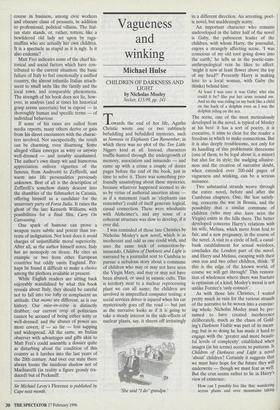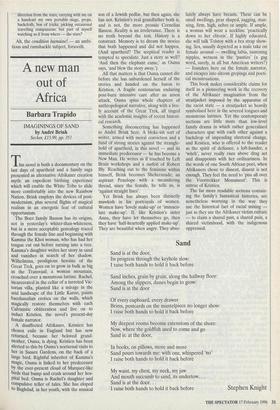Vagueness and winking
Michael Hulse
CHILDREN OF DARKNESS AND LIGHT by Nicholas Mosley Secker, £15.99, pp. 241 Twards the end of her life, Agatha Christie wrote one or two sublimely befuddling and befuddled mysteries, such as Nemesis or Elephants Can Remember, in which there was no plot of the Ten Little Niggers kind at all. Instead, characters truffle-hunted through the undergrowth of memory, association and innuendo — and came up with a crime a couple of dozen pages before the end of the book, just in time to solve it. There was something pro- foundly unsatisfying about these mysteries, because whatever happened seemed to do so by virtue of authorial assertion alone — as if a statement (such as 'elephants can remember') could of itself generate logical, casual connection. These were whodunits with Alzheimer's, and any sense of a coherent structure was slow to develop, if it ever did.
I was reminded of those late Christies by Nicholas Mosley's new novel, which is as incoherent and odd as one could wish, and uses the same trick of connection-by- innuendo. Children of Darkness and Light is narrated by a journalist sent to Cumbria to pursue a nebulous story about a commune of children who may or may not have seen the Virgin Mary, and may or may not have been abused, or used in satanic cults. This is territory near to a nuclear reprocessing plant we can all name; the children are involved in unspecified computer testing; a social services driver is injured when his car mysteriously goes off the road — but just as the narrative looks as if it is going to take a steady interest in the side-effects of nuclear plants, say, it sheers off irritatingly 'She said "I do" grandpa.' in a different direction. An arresting, poet- ic novel, but maddeningly scatty.
An important character who remains undeveloped in the latter half of the novel is Gaby, the pubescent leader of the children, with whom Harry, the journalist, enjoys a strangely affecting scene. 'I was conscious of my old root going down into the earth,' he tells us in the poetic-cum- anthropological vein he likes to affect: 'might it now at least flower above the top of my head?' Presently Harry is making love to a local woman, with Gaby (he thinks) behind him:
At least I was sure it was Gaby; who else could it be? She put her arms around me. And so she was riding on my back like a child on the back of a dolphin even as I was the dolphin riding on the sea.
The scene, one of the most meticulously developed in the novel, is typical of Mosley at his best: it has a sort of poetry, it is evocative, it aims to clear for the reader a freedom in which to make connections. But it is also deeply troublesome, not only for its handling of this problematic threesome (one of them, to be legal about it, a minor) but also for its style; the nudging allusive- ness and the creation of narrative doubt, when extended over 200-odd pages of vagueness and winking, can be a serious nuisance.
Two substantial strands weave through the entire novel, before and after the Cumbrian chapters. One, the less satisfy- ing, concerns the war in Bosnia, and the possibility that a similar commune of children (who may also have seen the Virgin) exists in the hills there. The better developed concerns Harry's relations with his wife, Melissa, which move from foul to fair, and a new pregnancy, in the course of the novel. A visit to a circle of hell, a canal- bank establishment for sexual weirdoes, concludes the London part of the novel, and Harry and Melissa, escaping with their own son and two other children, think: 'If this is the edge of the known world, of course we will get through!' This restora- tion of wholeness where there was fracture is optimism of a kind; Mosley's moral is not unlike Forster's 'only connect'.
As with those late Christies, I waited pretty much in vain for the various strands of the narrative to be woven into a convinc- ing whole. Nicholas Mosley must be pre- sumed to have created incoherence deliberately, much as the chaos of Gold- ing's Darkness Visible was part of its mean- ing; but in so doing he has made it hard to engage with the 'greater and more beauti- ful levels of complexity' established when images (in his terms) accrete to patterns. Is Children of Darkness and Light a novel 'about' children? Certainly it suggests that we must have hope for the future they will underwrite — though we must fear as well. But the crux seems rather to lie in Harry's view of existence:
How can I possibly live like this: wandering across plains and over mountains taking direction from the stars; carrying with me on a handcart my own portable stage, props, backcloth, box of tricks; picking occasional travelling companions: but part of myself watching as if from where — the stars?
Ah, the condition humaine! — an ambi- tious and ramshackle subject, forsooth.



























































 Previous page
Previous page